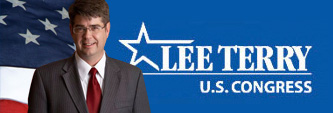U.S. Rep. Lee Terry has voted to protect millions of Americans from a $166 billion tax increase next year, a step that his opponent, John Ewing, is on record as opposing.
The House extended the tax cuts Wednesday on a vote of 256-171.
The nation faces a “Taxmageddon” on January 1, 2013, when current middle-class tax cuts enacted in 2001 and 2003 expire. Yesterday’s House action—supported by Terry—extends the tax relief. Without an extension, a typical middle class family in the Second district of Nebraska will pay between $1,600 and $2,200 in higher taxes starting next year.[1]
“There is a big difference between John Ewing and me on the issue of taxes. I support extending the current middle-class tax cuts. My opponent does not. His position would result in massive tax increases on middle-class families, something that couldn’t come at a worse time,” Terry said.
Ewing set his position on the issue in an Omaha World-Herald story published the day before he formally entered the race for Congress last summer. The article stated Ewing supports “. . . increases in revenue, notably by rolling back Bush’s tax cuts of 2001 and 2003 . . .”. [2] The article also said Ewing would be “pushing for the repeal of former President George W. Bush’s tax cuts.”
“A tax increase along the magnitude that my opponent supports will cause an economic contraction and the result will be a loss of jobs. We can’t afford ‘Ewingnomics.’ Families in Omaha and other Second district communities deserve better,” Terry said.
The 2001 and 2003 provisions lowered taxes on wage earners, families with children, small businesses and seniors who depend on investment or dividend income to make ends meet. All of the specific tax breaks expire at midnight on December 31 and, unless extended, will automatically revert to their prior, higher rates. The result will be a $166 billion tax increase on virtually all taxpayers starting January 1, 2013.[3]
The ramifications of this are stark: every tax bracket would increase next year—meaning every taxpayer will pay more. The child tax credit would be cut in half, falling from $1,000 per child now to $500. Dividend and investment income tax rates would skyrocket, hitting seniors’ hardest.
Terry strongly supported the original tax reductions when they were enacted in 2001 and 2003 and predicted the issue will be a major one in this year’s congressional race. If the tax cuts expire, approximately 114 million middle-class families will pay more in taxes.







